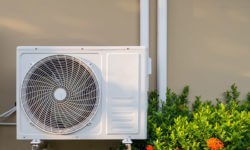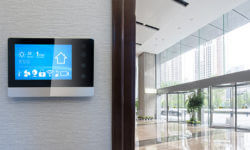We have gone into what geothermal systems are before. But, to recap, these systems work similarly to other HVAC structures except geothermal utilizes the ground rather than air. What we haven’t discussed is how geothermal heat pumps (GHP) work in large buildings. Since incorporating green technology is getting more popular so are commercial geothermal heat pumps. Not only are they eco-friendly they also offer low operating costs. So, for this article, let’s talk about the three main benefits of incorporating GHPs into your building.
Read more →Air handlers work with an air conditioning unit and/or heat pump to circulate air. They help make the system more energy-efficient and generally come in a large rooftop unit. Although, there are different areas in which you may find an air handling unit. It contains a blower, filter racks, cooling or heating elements, dampers, and sound attenuators. Air handlers also connect to the building’s ductwork ventilation system. There are a lot of misconceptions and basic information you need to know about an air handler. Here are the top five important things to know.
Read more →There are a lot of technologies we have discussed before. We specifically talked about many trends this year in HVAC technology. Many of these articles focused on indoor air quality, specific systems like chilled beams, and even net-zero buildings. However, there is a lot on the topic we still haven’t covered. When it comes to HVAC there is a lot of innovative technologies. So, for this article, we will be focusing on topics and systems we haven’t covered before.
Read more →In 2015, chilled beam technology was projected to grow nearly double by 2020. Now projections are showing the U.S. will contribute around 28% in chilled beam system demands by 2026. This is largely due to energy efficiency regulations in North America. Currently building energy consumption is about 40% of the total energy consumption in the U.S. As a push toward lower carbon emissions continues to grow, it stands to reason so will technologies that reduce energy consumption. Chilled beams offer major benefits in energy efficiency.
Read more →When talking about the health and wellbeing of employees or customers within a building, you are referencing the IEQ. IEQ, or Indoor Environmental Quality, includes air quality, lighting, thermal conditions, and ergonomics. Specifically, the effects they have on any occupants of a building. When building or designing a space, it is important to consider IEQ. Proper IEQ strategies protect people’s health, improve quality of life, reduce stress, and prevent potential injuries.
Read more →As we move into summer, more and more businesses are reopening. This is happening across the country. For this article, we are paying particular focus on Maryland, and Washington D.C. However, as more states are looking to reopen, this applies to any commercial business. As COVID-19 restrictions are lifted, people will be returning to work and customers to businesses. So, before you do that, what are the important HVAC systems to check before reopening?
Read more →Indoor Air Quality (IAQ) is a frequently overlooked factor in employee health and well-being. And, unfortunately, poor air quality is seldom recognized until people begin showing obvious health-related symptoms. As such, determining the cause of harmful air quality is difficult because there may be a host of problems occurring. Thankfully, a certified HVAC professional can help you improve indoor air quality in your building before it’s too late.
Read more →When choosing an HVAC system for your business or facility, you have plenty of options. If you’re deciding between a heat pump or an air conditioner, there are a few things to consider. Both use compressed refrigerants to collect heat from your indoor space and transfer it outside. However, which system is more beneficial to your specific building? To find out, it’s important to know the difference between the two.
Read more →When it comes to HVAC, the goal is to achieve maximum comfort and increase energy efficiency levels with smart and eco-friendly technology. Each year, building and commercial property owners are seeing their HVAC needs evolve. That’s why it’s important to stay up to date with the latest HVAC trends to ensure you are getting the very best service.
Read more →One common challenge that commercial properties face is proper air control, which can be solved by packaged HVAC systems. But, what’s the best way for facility managers to heat and cool a building? First, they need to consider all the HVAC systems that are available and which fits the property’s needs. For example, packaged HVAC systems are best for commercial spaces. They offer energy savings, easy maintenance, and a quieter building. Read more to learn more.
Read more →









